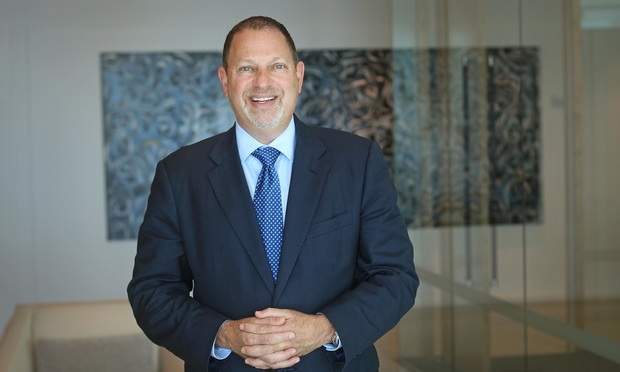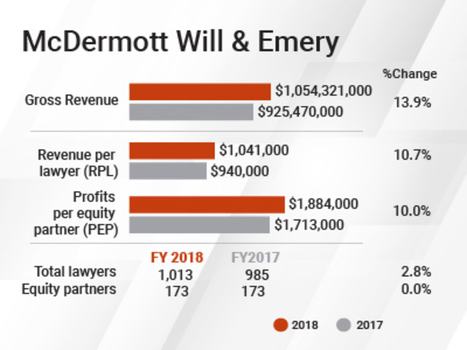Fueled by Hires and 'Happiness Factor,' McDermott Revenue Hits $1 Billion
A string of lateral hires from DLA Piper and elsewhere "exceeded even our optimistic expectations," said chair Ira Coleman, helping to boost revenue by nearly 14 percent last year.
March 01, 2019 at 09:54 AM
5 minute read
 Ira Coleman of McDermott Will & Emery. (Photo: J. Albert Diaz)
Ira Coleman of McDermott Will & Emery. (Photo: J. Albert Diaz)
Buoyed by key lateral additions, McDermott Will & Emery has surpassed the $1 billion mark in revenue for the first time in its 85-year history.
Gross revenue at the Chicago-based firm climbed 13.9 percent to $1.054 billion in 2018, up from $925 million the year prior. Revenue per lawyer increased 10.7 percent to $1.041 million, and profits per equity partner jumped 10 percent to $1.884 million from $1.713 million the year prior.
The number of attorneys at the firm grew 2.8 percent from 985 lawyers in 2017 to 1,013 lawyers in 2018. Despite its activity in the lateral market, the number of equity partners remained unchanged at 173 in 2018, while the nonequity partner tier shrank by 3.9 percent to 363.
 McDermott made waves in early 2018 by picking up a roughly 50-lawyer group from DLA Piper, in what chairman Ira Coleman expected would be a $100 million boost to the firm's top line, he wrote in an internal memorandum announcing the additions last March.
McDermott made waves in early 2018 by picking up a roughly 50-lawyer group from DLA Piper, in what chairman Ira Coleman expected would be a $100 million boost to the firm's top line, he wrote in an internal memorandum announcing the additions last March.
The hires were transformational, said Miami-based Coleman in an interview this week. “It outperformed and exceeded even our optimistic expectations,” he added.
McDermott's raid on the international legal giant began with the addition of Michael Poulos, a former co-managing partner of the Americas at DLA Piper in Chicago. It then brought aboard Michael Sheehan, the former co-chair of DLA Piper's global employment practice and chair of its U.S. employment practice.
The firm also later added Jeffrey Steiner, the former New York-based global co-chair of DLA Piper's finance practice, as well as 21 other partners. McDermott also added DLA Piper intellectual property partner Christina “Tina” Martini in Chicago.
Outside of its DLA Piper hires, McDermott last year added the head of Cooley's Los Angeles litigation practice William “Bill” Donovan, Jr. It also brought on the head of the nationwide state and local tax practice at Winston & Strawn Charles Moll III and colleagues Troy Van Dongen and Marcy Jo Mandel to expand its tax group in California. The firm opened an office earlier this year in San Francisco's Salesforce Tower—the tallest building in the city and west of the Mississippi—to accommodate the Northern California hires.
“We had some wonderful lateral acquisitions, and not just from the numbers, but the people,” Coleman said.
The firm also saw some notable departures. The former co-chair of the tax controversies group at McDermott, Jean Pawlow, decamped for Latham & Watkins early in the year. It also lost a group of roughly 30 IP lawyers, including 16 partners, who made their way to Morgan, Lewis & Bockius' offices in Chicago, Washington, D.C., San Francisco and Orange County, California.
“We have different ways that we want to do things and different things we want to push, and that works for us and hopefully it works for them there,” Coleman said of the group's departure.
In addition to revenue fueled by lateral hiring and a strong economy, Coleman credited McDermott's successes last year to a focused agenda that centered around three basic principles: indispensability to clients; high achievement, productivity and profitability; and a “happiness factor.”
“What we found is in our offices and our practice groups where people were the most productive they were the happiest,” said Coleman, who became chair of McDermott in late 2016.
The firm's health industry advisory group had an exceptional year, he noted. The firm was one of several law firms advising CVS Health Corp. on its $70 billion cash-and-stock purchase of health insurer Aetna Inc., which closed in November.
The tax and private client and wealth management practices also performed “incredibly well” in 2018, Coleman said. He said the firm represents 26 of the top 50 wealthiest families in the world.
The firm's London office also had a strong year, with nearly $41 million in revenue, up nearly 40 percent from the year prior.
Coleman said McDermott's plan for 2019 is to continue its growth and to use innovative tools and ways to differentiate itself.
“Using innovation to drive change and to be helpful for clients is a big goal for us for 2019 and beyond,” Coleman said. But he also cited a commitment to “the happiness factor.”
“Some places, especially law, you feel like you have to be a different person at work than you are really,” he said.
“We want people to bring their unique self [to] work and feel very comfortable about that,” Coleman said. “And we think that's something that's really important, and something that makes the place a lot better.'
This content has been archived. It is available through our partners, LexisNexis® and Bloomberg Law.
To view this content, please continue to their sites.
Not a Lexis Subscriber?
Subscribe Now
Not a Bloomberg Law Subscriber?
Subscribe Now
NOT FOR REPRINT
© 2025 ALM Global, LLC, All Rights Reserved. Request academic re-use from www.copyright.com. All other uses, submit a request to [email protected]. For more information visit Asset & Logo Licensing.
You Might Like
View All

Three Akin Sports Lawyers Jump to Employment Firm Littler Mendelson

Brownstein Adds Former Interior Secretary, Offering 'Strategic Counsel' During New Trump Term
2 minute read
Trending Stories
- 1How ‘Bilateral Tapping’ Can Help with Stress and Anxiety
- 2How Law Firms Can Make Business Services a Performance Champion
- 3'Digital Mindset': Hogan Lovells' New Global Managing Partner for Digitalization
- 4Silk Road Founder Ross Ulbricht Has New York Sentence Pardoned by Trump
- 5Settlement Allows Spouses of U.S. Citizens to Reopen Removal Proceedings
Who Got The Work
J. Brugh Lower of Gibbons has entered an appearance for industrial equipment supplier Devco Corporation in a pending trademark infringement lawsuit. The suit, accusing the defendant of selling knock-off Graco products, was filed Dec. 18 in New Jersey District Court by Rivkin Radler on behalf of Graco Inc. and Graco Minnesota. The case, assigned to U.S. District Judge Zahid N. Quraishi, is 3:24-cv-11294, Graco Inc. et al v. Devco Corporation.
Who Got The Work
Rebecca Maller-Stein and Kent A. Yalowitz of Arnold & Porter Kaye Scholer have entered their appearances for Hanaco Venture Capital and its executives, Lior Prosor and David Frankel, in a pending securities lawsuit. The action, filed on Dec. 24 in New York Southern District Court by Zell, Aron & Co. on behalf of Goldeneye Advisors, accuses the defendants of negligently and fraudulently managing the plaintiff's $1 million investment. The case, assigned to U.S. District Judge Vernon S. Broderick, is 1:24-cv-09918, Goldeneye Advisors, LLC v. Hanaco Venture Capital, Ltd. et al.
Who Got The Work
Attorneys from A&O Shearman has stepped in as defense counsel for Toronto-Dominion Bank and other defendants in a pending securities class action. The suit, filed Dec. 11 in New York Southern District Court by Bleichmar Fonti & Auld, accuses the defendants of concealing the bank's 'pervasive' deficiencies in regards to its compliance with the Bank Secrecy Act and the quality of its anti-money laundering controls. The case, assigned to U.S. District Judge Arun Subramanian, is 1:24-cv-09445, Gonzalez v. The Toronto-Dominion Bank et al.
Who Got The Work
Crown Castle International, a Pennsylvania company providing shared communications infrastructure, has turned to Luke D. Wolf of Gordon Rees Scully Mansukhani to fend off a pending breach-of-contract lawsuit. The court action, filed Nov. 25 in Michigan Eastern District Court by Hooper Hathaway PC on behalf of The Town Residences LLC, accuses Crown Castle of failing to transfer approximately $30,000 in utility payments from T-Mobile in breach of a roof-top lease and assignment agreement. The case, assigned to U.S. District Judge Susan K. Declercq, is 2:24-cv-13131, The Town Residences LLC v. T-Mobile US, Inc. et al.
Who Got The Work
Wilfred P. Coronato and Daniel M. Schwartz of McCarter & English have stepped in as defense counsel to Electrolux Home Products Inc. in a pending product liability lawsuit. The court action, filed Nov. 26 in New York Eastern District Court by Poulos Lopiccolo PC and Nagel Rice LLP on behalf of David Stern, alleges that the defendant's refrigerators’ drawers and shelving repeatedly break and fall apart within months after purchase. The case, assigned to U.S. District Judge Joan M. Azrack, is 2:24-cv-08204, Stern v. Electrolux Home Products, Inc.
Featured Firms
Law Offices of Gary Martin Hays & Associates, P.C.
(470) 294-1674
Law Offices of Mark E. Salomone
(857) 444-6468
Smith & Hassler
(713) 739-1250









